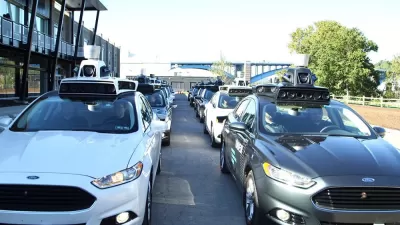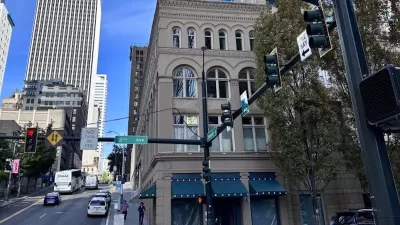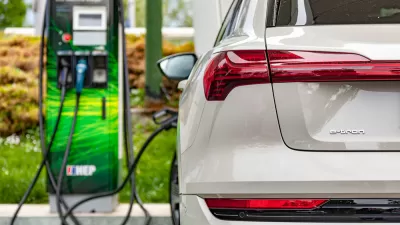In the absence of more enlightened policies, technological change is as likely to increase pollution as to decrease pollution.

To receive the latest news in road lobby advocacy, I get Robert Poole’s "Surface Transportation Innovations" newsletter, which consistently advocates for more roads and less transit. In the most recent edition, he writes: "if zero-emission and increasingly automated vehicles actually are our future, then the current California focus on reducing VMT … is not required." This claim illustrates a common assumption: that we really don't need to do anything at all to reduce vehicle miles traveled, because electric cars will magically save us.
What's wrong with this claim? For one thing, well-intentioned commentators have been making this claim for decades; Poole himself cites a 1998 article. If people keep claiming that clean energy is right around the corner, and clean energy never comes, at what point do we give up on the dream?
More broadly, the "clean car" dream is based on the assumption that technological change is inherently pro-environmental. But in recent years, human ingenuity has been devoted to finding new ways to make our cities more polluted and dangerous than ever.
For example, the rise of Uber, Lyft, and similar companies has made taxicab service cheaper. Of course, this means more people taking cabs and fewer people taking transit; at least one study suggests that the rise of Uber etc correlates with declining transit ridership in big cities.
Meanwhile, car companies have been persuading Americans to buy gigantic trucks, which they call sport utility vehicles (SUVs)—rather oddly, since I don't know of any sports that you can play while driving one. SUVs typically have lower fuel economy than other cars; thus, this so-called advance has actually led to more pollution rather than less pollution. To make matters worse, SUVs have been literally wiping pedestrians off the roads. As SUVs have become more popular, the number of pedestrian deaths involving them has increased by 50 percent since 2013. Because these vehicles are taller, they tend to strike pedestrians in the head and the chest rather than in the legs, thus increasing the chances that a collision will lead to death.
Even if electric cars come, they may not be as good for air quality as we might like to think. Although electric cars do not directly create emissions, they are only as green as the electricity they run on—which means that where the power supply is highly dependent on coal and other fossil fuels, they still create significant greenhouse gas emissions.
I don't know whether electric cars will ever become widespread. But I do know that until they do, other technological change may do more harm than good.

Planetizen Federal Action Tracker
A weekly monitor of how Trump’s orders and actions are impacting planners and planning in America.

Map: Where Senate Republicans Want to Sell Your Public Lands
For public land advocates, the Senate Republicans’ proposal to sell millions of acres of public land in the West is “the biggest fight of their careers.”

Restaurant Patios Were a Pandemic Win — Why Were They so Hard to Keep?
Social distancing requirements and changes in travel patterns prompted cities to pilot new uses for street and sidewalk space. Then it got complicated.

DC Area County Eliminates Bus Fares
Montgomery County joins a growing trend of making transit free.

Platform Pilsner: Vancouver Transit Agency Releases... a Beer?
TransLink will receive a portion of every sale of the four-pack.

Toronto Weighs Cheaper Transit, Parking Hikes for Major Events
Special event rates would take effect during large festivals, sports games and concerts to ‘discourage driving, manage congestion and free up space for transit.”
Urban Design for Planners 1: Software Tools
This six-course series explores essential urban design concepts using open source software and equips planners with the tools they need to participate fully in the urban design process.
Planning for Universal Design
Learn the tools for implementing Universal Design in planning regulations.
Heyer Gruel & Associates PA
JM Goldson LLC
Custer County Colorado
City of Camden Redevelopment Agency
City of Astoria
Transportation Research & Education Center (TREC) at Portland State University
Camden Redevelopment Agency
City of Claremont
Municipality of Princeton (NJ)






























